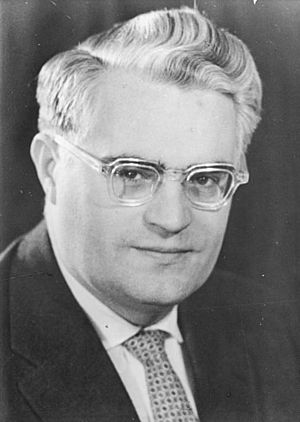Gerald Götting facts for kids
Quick facts for kids
Gerald Götting
|
|
|---|---|

Gerald Götting in May 1961
|
|
| President of the Volkskammer | |
| In office 12 May 1969 – 29 October 1976 |
|
| Preceded by | Johannes Dieckmann |
| Succeeded by | Horst Sindermann |
| Deputy Chairman of the State Council | |
| In office 12 September 1960 – 7 November 1989 |
|
| Personal details | |
| Born | 9 June 1923 Nietleben, Province of Saxony Germany |
| Died | 19 May 2015 (aged 91) Berlin, Germany |
| Political party | Christian Democratic Union |
| Profession | Politician |
Gerald Götting (born June 9, 1923 – died May 19, 2015) was an important German politician. He led the East German Christian Democratic Union (CDU) party from 1966 to 1989. He also served as the President of the People's Chamber (Volkskammer) from 1969 to 1976. The Volkskammer was like the parliament or main law-making body of East Germany. From 1960 to 1989, he was a deputy chairman of the State Council of East Germany, which was a high-ranking government position.
Contents
Early Life and Education
Gerald Götting was born in Nietleben, a place that is now part of Halle/Saale. This was in the German region called the Province of Saxony.
During World War II, he was part of the Reichsarbeitsdienst. This was a group that helped with support and supplies for the army. Later, he served in the Wehrmacht, which was the German armed forces. In 1945, he was briefly held as a prisoner of war by American soldiers.
In 1946, after the war, Götting joined the Christian Democratic Union (CDU). This was a political party in East Germany that had Christian-democratic ideas. He then studied German, history, and languages at the Martin Luther University of Halle.
Political Career in East Germany
In 1949, Gerald Götting became the General Secretary of the CDU party. That same year, the German Democratic Republic (GDR), also known as East Germany, was formed. He was elected as a member of the People's Chamber (Volkskammer). He served in this important law-making body for 40 years.
Götting was a strong supporter of the Communist Socialist Unity Party (SED). This party was the main ruling power in East Germany. He helped make sure the CDU party worked closely with the SED.
Over the years, Götting held many powerful jobs in East Germany.
- From 1949 to 1963, he was the leader of the CDU group in the People's Chamber.
- From 1958 to 1963, he was a Deputy Prime Minister of East Germany.
- From 1963 to November 1989, he was the Deputy Chairman of the Council of State. This job was similar to being a vice-president.
- He was also the Chairman of the People's Chamber from 1969 to 1976. He was its Vice-Chairman from 1969 to 1989.
In 1966, Götting was chosen to be the Chairman of the CDU party. As chairman, he worked closely with other parties in the National Front. This was an alliance of parties led by the SED that governed East Germany. During his time as party leader, he wrote books about how Christianity and socialism could work together.
Other Activities and Later Years
Gerald Götting also held other positions in East German society. From 1961 to 1969, he was the Vice-President of the German-African Society. From 1963, he was a member of the Albert Schweitzer Committee. He met with Albert Schweitzer, a famous doctor and humanitarian, twice. He wrote about these meetings in his book, "Begegnungen mit Albert Schweitzer" (Meetings with Albert Schweitzer). In 1976, Götting became the Chairman of the People's Friendship League of the GDR.
On November 2, 1989, just a few days before the Berlin Wall fell, Götting had to resign as Chairman of the CDU. Five days later, he also left his job as a member of the Council of State. In December, he was arrested, but he was released in February 1990.
Gerald Götting passed away in Berlin on May 19, 2015, at the age of 91.
See also
 In Spanish: Gerald Götting para niños
In Spanish: Gerald Götting para niños
 | Audre Lorde |
 | John Berry Meachum |
 | Ferdinand Lee Barnett |

